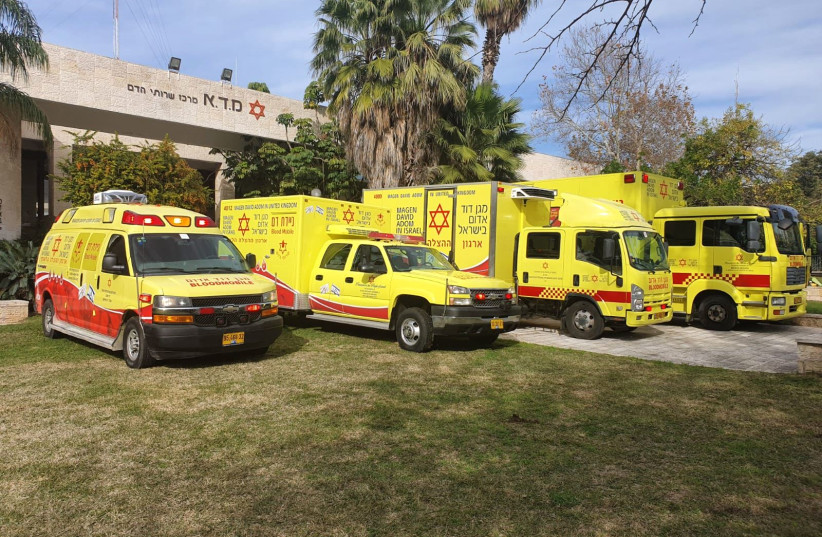Blood donations now being accepted from those born in Britain

In December 1999, a ministry directive was issued that prevented all those who had lived in Britain for over six consecutive months from donating blood.
People born in Britain and those who lived there between 1980 and 1996 are now permitted to donate blood in Israel. It was forbidden 24 years ago after a new variant of Creutzfeldt Jacob disease (Bovine spongiform encephalopathy or BSE, which was nicknamed Mad Cow Disease) was discovered in those who had received blood in that country after it was transferred from infected cows to humans. The announcement was issued on Sunday by Magen David Adom (MDA) following a decision by the Health Ministry.In December 1999, a ministry directive was issued that prevented all those who had lived in Britain for over six consecutive months from donating. A similar order was issued later regarding those who had lived in France, Ireland and Portugal as well. These instructions led to many people who had moved from the above countries to Israel or tourists, being prevented from donating blood – and they felt discriminated against and insulted.
From 1977, blood donations from Ethiopian Jewish Israelis were thrown out by MDA because fear of the spread of a different disease – HIV/AIDS – with the same effect on the immigrants. The Ethiopia issue was raised publicly in 2013 when Knesset members called for an examination of MDA blood donation policies after an Ethiopian-born Yesh Atid MK – Pnina Tamano-Shato (who later became absorption minister) – was rejected as a donor. She had been told she could donate but that the blood would be frozen and never used. The “discrimination” led to violent demonstrations between Ethiopian immigrants and the police, and the policy was revoked.
Rule for blood donations from gay men changed
The ministry had also changed the rules for blood donations from gay men and those older than 65.
At the end of 2022, the US Food and Drug Administration (FDA) issued new recommendations to reduce the possibility of the transfer of CJD of vCJD through blood or its components. These recommendations are based on new information that was prepared and published in Britain, and according to risk assessment models, the calculated risk of transfer of vCJD through plasma from blood donations is one or two cases every 50 years. This risk does not justify turning away blood donors in the same way as in the past, the FDA said. In addition, the risk to patients receiving immunoglobulin (IVIG) treatment is also negligible. Filtering the blood components to separate the white blood cells from the blood components increases safety. Following the recommendation of the professional committee that advises the Health Ministry on the subject of blood donations, it adopted the FDA directives on this matter and canceled the restrictions of receiving blood donations from those from Britain.
The recommendations were: No longer turning away donors for the following reasons (indefinitely):
Geographical risk of exposure to BSE after living in Britain between 1980 and1996, and France and Ireland between 1980 and 2001; receiving blood in Britain, France and Ireland since 1980; and returning to the donor pool those who in the past had been rejected due to the above geographical restrictions, on condition that they fulfill all other criteria for blood donors in Israel. The question that prevented the above donors from donating is being removed from the blood donors’ questionnaire. A question regarding the residence of over six months in Britain between 1980 and 1996 or receipt of blood transfusions/operations in Britain since 1980 will be added to the questionnaire so that these units of blood will be sent for filtration before being given to patients. Prof. Eilat Shinar, MDA deputy director-general for blood services, welcomed the change in policy: “For many years, we’ve had to turn away those who made Aliya from these countries or had resided there for over six months. We're pleased to tell all our loyal blood donors, who continued to approach us and asked us to change the regulations that this day has finally arrived. We will be pleased to welcome these donors once again at MDA blood donation locations across Israel so as to continue to fulfill the demands of the hospitals and the Israel Defense Forces, provide blood units and components safely and at a high standard, to all those who require this treatment in order to save their lives.” MDA blood services call on the public to donate blood at blood donation locations in shopping malls, MDA stations, and other public spaces across Israel. Location details can be found on the MDA website at www.mdais.il/en.
The donations take place according to Health Ministry regulations regarding COVID-19. People who have recovered or were exposed to Corona patients can donate blood seven days after receiving a recovery certificate; vaccinated or recovered patients who have been exposed – can give blood with no restriction dependent on a declaration of a negative antigen test taken three days following the exposure; and non-vaccinated/non-recovered who have been exposed to the virus can donate blood after five days, dependent on a declaration of a negative antigen test on the fifth day after exposure. Anyone interested in arranging a blood donation session (minimum of 30 donors) in their neighborhood or workplace, can call MDA blood services at 03-5300400.
Jerusalem Post Store
`; document.getElementById("linkPremium").innerHTML = cont; var divWithLink = document.getElementById("premium-link"); if (divWithLink !== null && divWithLink !== 'undefined') { divWithLink.style.border = "solid 1px #cb0f3e"; divWithLink.style.textAlign = "center"; divWithLink.style.marginBottom = "15px"; divWithLink.style.marginTop = "15px"; divWithLink.style.width = "100%"; divWithLink.style.backgroundColor = "#122952"; divWithLink.style.color = "#ffffff"; divWithLink.style.lineHeight = "1.5"; } } (function (v, i) { });

